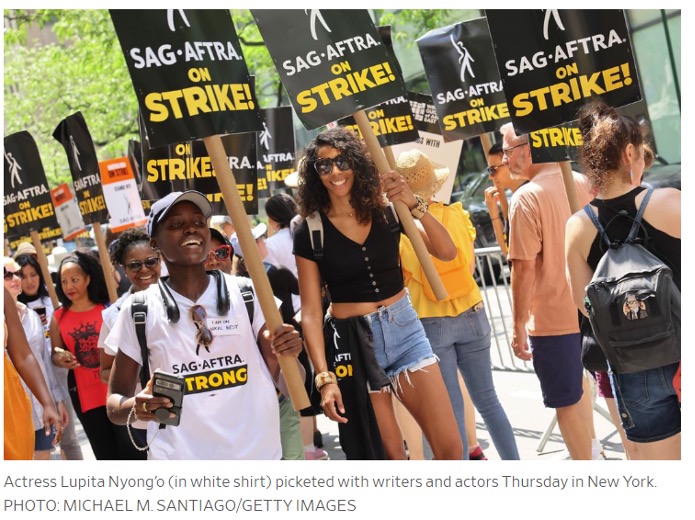 LOS ANGELES—Hollywood’s biggest strike in 60 years is exposing fault lines between the industry’s giants, with traditional entertainment companies expected to take a near-term hit while streamers such as Netflix NFLX -2.26%decrease; red down pointing triangle are better positioned for a long stalemate.
LOS ANGELES—Hollywood’s biggest strike in 60 years is exposing fault lines between the industry’s giants, with traditional entertainment companies expected to take a near-term hit while streamers such as Netflix NFLX -2.26%decrease; red down pointing triangle are better positioned for a long stalemate.
Though they hope for a quick resolution, entertainment executives say they are contemplating the prospect that the joint strike by actors and writers could drag on for months—even through the end of the year.
Warner Bros. Discovery WBD -1.41%decrease; red down pointing triangle, Paramount Global PARA -2.48%decrease; red down pointing triangle and Walt Disney are among the traditional companies whose broadcast-TV and movie businesses could be massively disrupted within months. Netflix and Amazon.com might not feel the pinch until 2025 or beyond, entertainment executives and analysts said.
Over time, the industry’s solidarity may be tested. That said, for now the big media and tech companies are operating in lockstep. The writers went on strike in May and the actors joined them last week, pushing for higher pay and guardrails for the use of generative artificial-intelligence technology in the industry, among other issues.
In the broadcast realm, advertisers made spending commitments this spring, thinking network shows such as ABC’s “Abbott Elementary,” CBS’s “Young Sheldon” and NBC’s “Law & Order: SVU” would be in production this summer in time for the fall season. They aren’t, and instead the lineups will feature a lot of reruns, shows from streaming services, international programming and already-produced reality fare.
In the premium cable and streaming world, fans could be waiting a long time for some high-end favorites to return. Warner’s HBO is set through the middle of the next year with shows such as “The Gilded Age,” “True Detective” and “House of the Dragon.” But a work stoppage through year’s end could push the next installments of high-profile shows like “Euphoria” and “The White Lotus” into 2025.
A prolonged strike may even lead companies to rethink when they release finished shows and movies, if the stars aren’t available to help promote them.
At the heart of the fight between the companies and the two unions—the Screen Actors Guild and the Writers Guild of America—is the entertainment industry’s dramatic transformation over the past decade, with the fading of a lucrative system fueled by cable-TV subscriptions and rerun sales and the rise of a profit-challenged streaming industry in its place. Having made huge bets on content, traditional companies are collectively losing billions of dollars a year on streaming.
“All of this was caused by streaming overinvestment and various levels of delusion,” said Barry Diller, a veteran media mogul who was once a top executive at Paramount and Fox. “If you drive all the business models only towards streaming, the result of it is that all of the feeder mechanisms—broadcast, cable—disappear.” Diller is now chairman of media conglomerate IAC.
The unions want the new streaming world to carry on practices of the old guard, including big-enough royalty checks, or “residuals,” to help actors and writers from successful shows and movies navigate the fallow periods between jobs. Entertainment executives have offered increases but not enough for the strikers. A return to the old ways is impossible, they say.
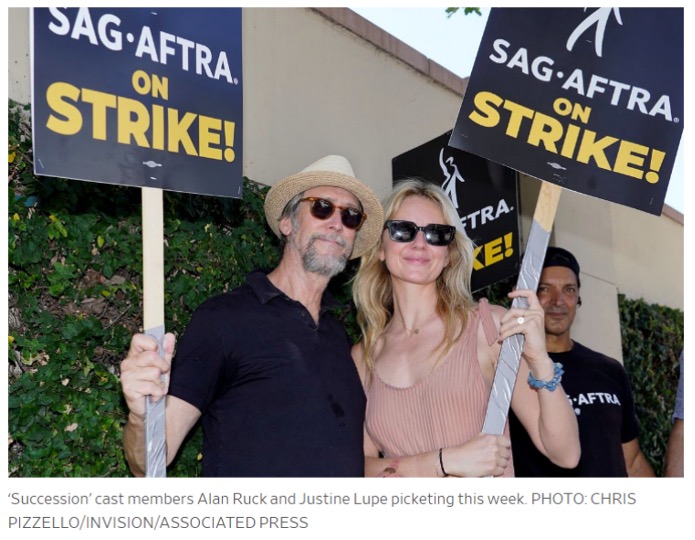
Alan Ruck, who played overshadowed sibling Connor Roy in HBO’s “Succession,” said he’s frustrated to hear entertainment executives say old practices of paying residuals don’t fit the streaming world. “It doesn’t apply anymore, because it’s streaming. Why? Just because you said so?” said Ruck, who was protesting outside the Warner Bros. studio lot alongside a throng of others from SAG and WGA.
Privately, some entertainment executives say the pivot to streaming was the work of both sides. Many writers and actors welcomed big upfront paydays from the likes of Netflix in lieu of a potential payoff from reruns, the executives say. They enjoyed the flexibility of 10-episode seasons in streaming compared with the 22-episode network-TV grind. In short, they say, the talent wanted this new world order—until it wasn’t working out.
Entertainment companies will see savings from the production shutdowns, but spending likely will just be shifted to later, said Tim Nollen, an analyst at Macquarie. “That’s a short-term phenomenon, for however long the strike lasts,” he said.
Moody’s Investors Service estimates that new contracts with the writers and actors, combined with a pact already reached with directors, could collectively cost media companies an additional $450 million to $600 million a year over the three years of the agreements.
Cable-TV subscriptions have been in decline for years, but the strikes likely won’t speed cord-cutting, said Justin Moreau, a portfolio manager at investment firm AllianceBernstein. “People who are still subscribing to the pay-TV bundle today are not necessarily subscribing for prime-time entertainment,” he said. “They care about the sports programs.”
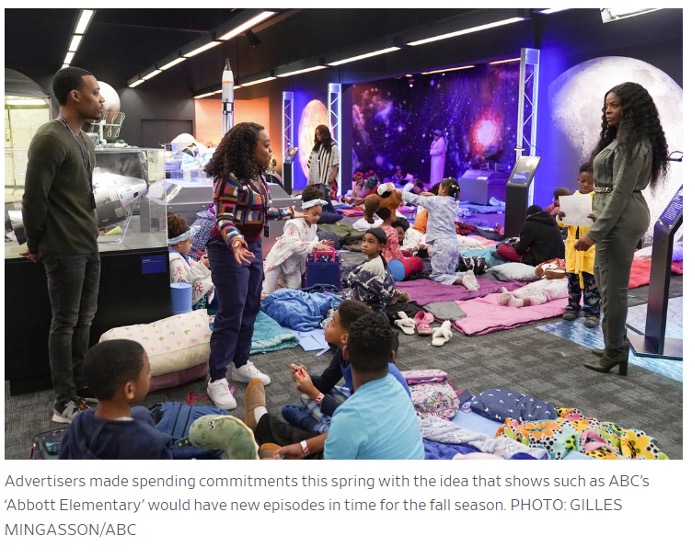
Some entertainment executives expressed frustration that the strike, in their view, will give Netflix an advantage. The longer it goes on, the more it will hurt the theatrical-movie business, where Netflix isn’t a player, they said. Netflix also has a stockpile of already-produced content from around the world that could help keep its shelves stocked.
“They are now the beneficiary of the final destruction of the old model,” Diller said.
Netflix said Wednesday that its content spending this year would be lower as a result of the strike and lead to stronger-than-expected free cash flow. The company reported a robust new-subscriber count of 5.9 million in the second quarter, thanks partly to its password-sharing crackdown, and $1.5 billion in profit. Revenue growth failed to impress Wall Street, though, and shares fell.
The strike will test the solidarity of writers and actors as well as the studios, given the vast differences in the earning power and job security among the union members. They range from A-list actors and premier TV showrunners to people living paycheck to paycheck, and those in between.
In the traditional TV world, a show’s biggest financial payoff came after the episode count reached about 100, around five seasons’ worth. That is when they generally went into “syndication,” with reruns on cable and local TV channels, and licensing deals for foreign markets.
Even network shows that didn’t reach that level of success provided economic security, union members say. That is in contrast to streaming, they say, where actors are paid while they are on a show but—because shows generally live on the platform forever and don’t go into reruns—earn less in residuals.
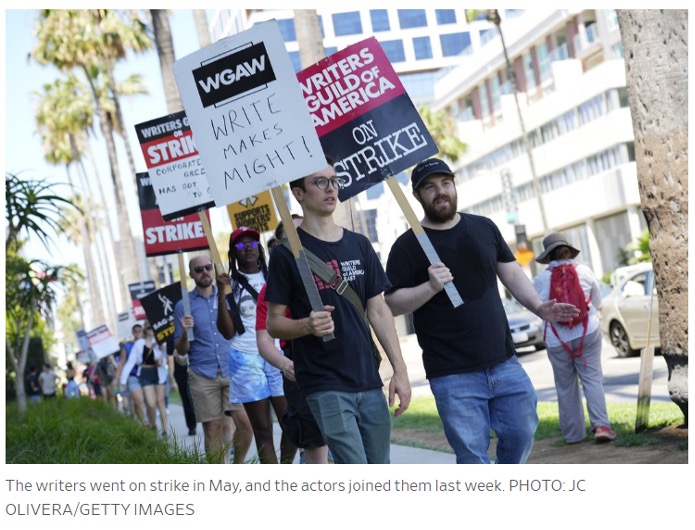
“The only reason I’m not broke now is because I’ve been dependent on the residuals from network TV, before streaming,” said Nelson Franklin, an actor who was in the picket line outside Netflix on Thursday. He said he has relied heavily on the 40 episodes he did on ABC’s “Black-ish,” a show that went into syndication. He said in a good year in traditional TV he could be in eight episodes, making upward of $7,000 apiece, plus residuals, while in streaming he figures he can make $8,000 a year for the same work.
Actress Stephanie Czajkowski said a single episode from her stint on CBS’s “Criminal Minds” in 2010 has generated more money for her in some years, via residuals, than the paychecks she gets from appearing on seven episodes of a streaming show.
One of SAG’s demands was that 2% of streaming revenue be paid to performers, with a formula developed to compensate them based on a show’s popularity. That was a nonstarter for the Alliance of Motion Picture and Television Producers, the coalition negotiating on behalf of major studios, streamers and networks.
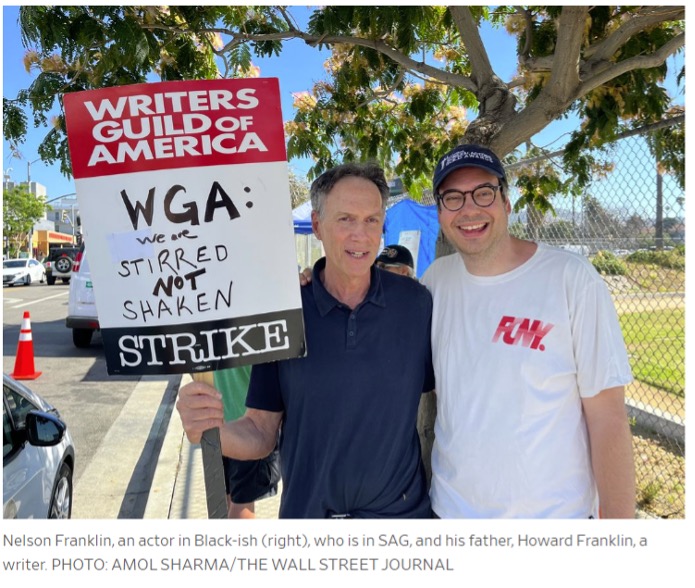
That would be on top of the residuals that streamers already pay actors and writers, which are also likely to increase in a new deal, the alliance has said.
In broadcast TV, coping mechanisms are snapping into place. CBS plans to air reruns of “Yellowstone,” the Kevin Costner drama that airs on its sister channel Paramount Network. CBS also plans to air the British version of its hit comedy “Ghosts.” NBC has some original dramas in the cupboard it will haul out, including new episodes of “Magnum P.I.” and “Quantum Leap.”
Netflix isn’t the only streamer with a deep library. As of now, Warner’s Max has fresh content to get through the middle of next year. But some big projects stalled before they really got off the ground, including a blockbuster series in the works based on “Harry Potter.”
Entertainment executives say the strikes are a dangerous development for the movie industry, which was in the middle of a fragile recovery from the pandemic—consumers heading back to theaters, though in smaller numbers. For Warner Bros., the buzz of its coming release of “Barbie,” which looks poised for a major opening, will give way to uncertainty about holiday movies such as “The Color Purple,” while if the strike drags on past the summer future productions such as Universal’s disaster film “Twisters” and Paramount’s next “Mission: Impossible” movie could be delayed.
Reference:
Joe Flint, Amol Sharma. July 21 2023. Streaming Brought Hollywood to a Standstill. Now Comes the Pain. The Wall Street Journal. https://www.wsj.com/articles/streaming-brought-hollywood-to-a-standstill-now-comes-the-pain-3afcbb68?mod=business_lead_pos5
Swipe left and right to see everything